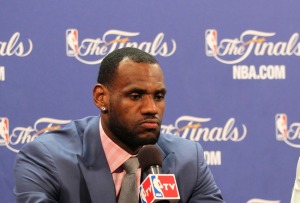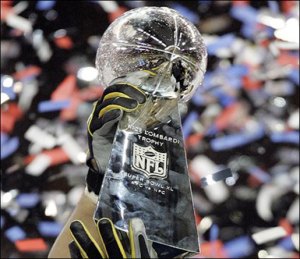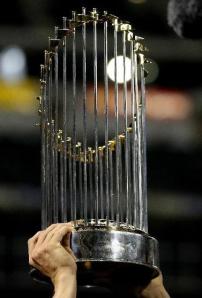In an article featured on CNNSI.com today, Miami Heat Forward and presumptive league MVP LeBron James opens up about last season with the Heat and about his legacy as a player. This season has been maybe the best statistically of James’ illustrious career so far, with LeBron putting up numbers on a nightly basis not seen in more than 20 years. But all of the sporting world knows that LeBron will go down in basketball annals as a shorter Wilt Chamberlain if he doesn’t start bringing titles along with his talents to South Beach.

Perhaps the most revealing quote from “King” James comes in the first third of the article when discussing not having a championship on his lengthy resume’:
He went for rings, presumably fistfuls of them. “No, not a fistful,” James says. “I don’t need a fistful. But I need one. I need to get one first. I have short goals — to get better every day, to help my teammates every day — but my only ultimate goal is to win an NBA championship. It’s all that matters. I dream about it. I dream about it all the time, how it would look, how it would feel. It would be so amazing.”
Now, the phrase, “(Insert NBA Legend here) would never say” has become a cliche’. But the problem with LeBron is that it keeps ringing true. Kobe Bryant, after 16 years in the league is still maniacally obsessed with winning a 6th ring. The pursuit of another ring is what kept Shaq on the court well past his time and made him an NBA nomad in the latter stages of his career. In my heart I think Michael Jordan believes that with the right players around him and enough time to get in shape he could win a 7th championship even at the ripe old age of 49. After all, didn’t LeBron himself create the high standards for the Miami Heat with his self made proclamation that he had come to Miami to win “Not two, not three, not four, not five, not, six, not seven…” So why back off now LeBron?
There has never been a question regarding LeBron’s physical talents. In fact, “The Big Dipper” may be the only other athlete so blessed and cursed with the kind of athletic prowess that James displays on a nightly basis. But it becomes more and more apparent as the years go by that the media and the basketball public have placed a burden on LeBron James that he was never equipped to bear. Noted journalist Buzz Bissinger, of “Friday Night Lights” fame and co-author of LeBron’s autobiography “Shooting Stars” observed of James in high school:
“As for being a team leader, the very notion is a joke. James doesn’t have the presence; his affect is flat and dull, eager to avoid confrontation because of a difficult childhood in the Akron projects in which his only goal was to stay away from trouble. For all the endless hype, he wasn’t even a leader on his high school team. The role belonged to a fiery point guard name Dru Joyce III, who routinely got into fights with teammates during practice. James was a silly kid, fond of passing gas with booming impact.”
LeBron is too deferential, a teammate almost to a fault. Greatness in many regards requires selfishness. Michael Jordan never learned to defer to Scottie Pippen, even knowing that he needed him to succeed. He famously said, “There is no I in team, but there is one in ‘Win’. After going 3-14 through 3 quarters against the Oklahoma City Thunder this past Sunday, Kobe Bryant still knew he was going to be the difference between winning and losing and made difficult, yet for Kobe wholly expected, shot after shot to pull out a double overtime victory. We were seduced by that night in the Palace of Auburn Hills when LeBron scored 48 points including 29 of the Cavaliers’ last 30. But that was 5 years ago. LeBron may just be 27 years old, but this is his 9th season, and when he entered the NBA no one believed we would have reached this point with this player.
LeBron may win that elusive championship this season, maybe he won’t. But if LeBron thinks that one title will change the perception that has been building over these last nine years, he’s mistaken. We won’t be satisfied, and he shouldn’t be either.
– David Grubb

